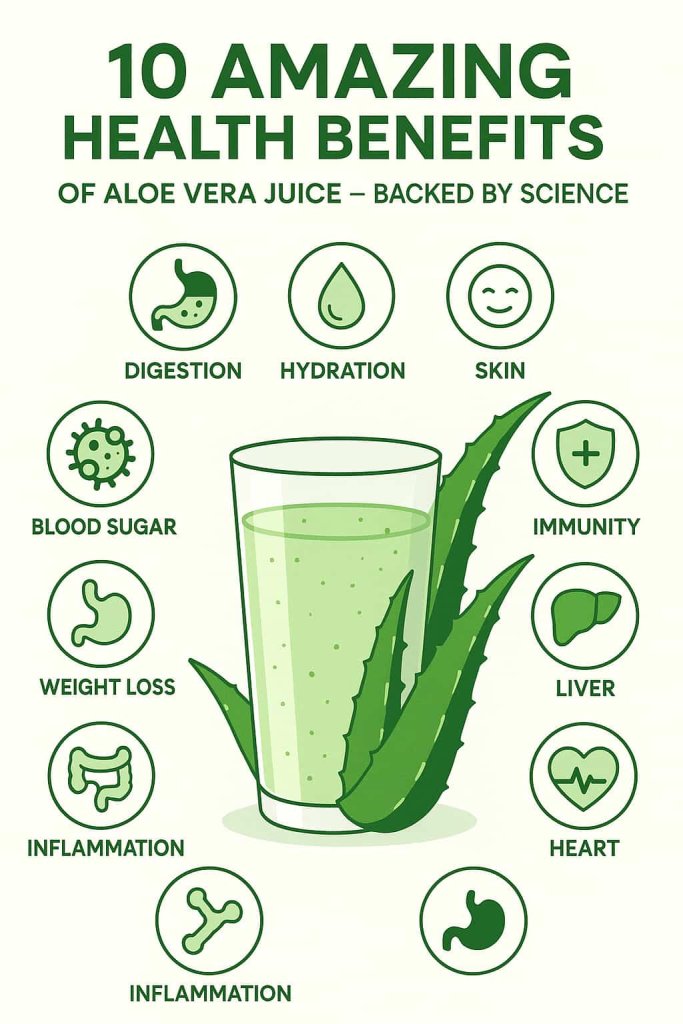Aloe vera juice offers science-backed benefits for digestion, hydration, skin, and blood sugar control — but it should be consumed in moderation.
This natural drink, made from the inner gel of the Aloe barbadensis Miller plant, has gained popularity for its wide-ranging health effects. Understanding the true benefits (and limits) of aloe vera juice helps you use it safely and effectively for wellness.

Below, we explore 10 evidence-based benefits of aloe vera juice, including how to use it properly, recent research findings, and important precautions.
🌱 What Is Aloe Vera Juice?
Aloe vera juice is a hydrating liquid extracted from the inner leaf gel of the aloe plant. It’s often mixed with purified water and sold as a wellness beverage.
Unlike aloe latex (the bitter yellow layer under the leaf’s skin), aloe juice is generally safe when processed correctly to remove aloin — a compound that can cause laxative effects.
- Main nutrients: Vitamin C, vitamin E, B vitamins, calcium, magnesium, and antioxidants.
- Calories: Very low — roughly 8–10 calories per 100 ml (depending on brand).
- Forms: Ready-to-drink bottles, concentrate, or homemade by blending fresh gel with water.
👉 Always choose “decolorized, purified” aloe juice labeled as safe for internal use.
10 Amazing Health Benefits of Aloe Vera Juice — Backed by Science
1. Supports Digestive Health

Aloe vera juice is widely recognized for its soothing effects on the digestive system. The drink contains polysaccharides and enzymes that support nutrient absorption and promote gentle detoxification. According to Medical News Today (2023), these natural compounds can help relieve occasional constipation and support smoother bowel movements when consumed in moderation.
Unlike harsh laxatives, aloe vera works by increasing water content in the intestines and improving peristalsis — the movement of the gut muscles. It can also help reduce irritation in the lining of the stomach and intestines, offering relief to those with mild digestive discomfort or bloating.
Quick Tip: Drink 2–4 ounces of aloe vera juice before meals to support digestion naturally, but avoid excess consumption to prevent diarrhea or cramps.
2. Keeps You Hydrated

Aloe vera juice is composed of 99% water, making it an excellent natural hydrator. Hydration is essential for nutrient transport, temperature regulation, and organ health. The juice also provides natural electrolytes — like magnesium, potassium, and calcium — that help maintain fluid balance in the body, especially after workouts or in hot weather.
According to Healthline (2024), regular intake of aloe vera juice can help prevent dehydration, particularly in individuals who engage in physical activity or consume caffeine, which can increase fluid loss.
Did you know? Proper hydration also supports kidney function and helps the body flush out toxins more effectively.
3. May Help Regulate Blood Sugar Levels

Several early studies suggest that aloe vera may play a role in blood sugar regulation. The polysaccharides and phytosterols in aloe have been found to influence glucose metabolism and insulin sensitivity.
The National Center for Complementary and Integrative Health (NCCIH, 2024) notes that aloe vera supplements and juice might help lower fasting blood glucose and HbA1c levels in people with prediabetes or type 2 diabetes. However, results vary among studies, and more research is needed before firm recommendations can be made.
Caution: Aloe vera may interact with antidiabetic medications and enhance their effects, possibly leading to hypoglycemia.
👉 Always consult your healthcare provider before using aloe vera juice as part of your diabetes management plan.
4. Promotes Healthy Skin from Within

Aloe vera has long been a staple in skincare — and now research shows that drinking aloe vera juice can nourish your skin from the inside out. The juice is rich in antioxidants like vitamins C and E, which protect skin cells from oxidative stress and help maintain collagen integrity.
According to Healthline (2024), aloe vera’s hydration and nutrient profile can improve skin elasticity and reduce dryness. Some studies even suggest it may help ease mild acne and inflammation due to its anti-inflammatory compounds.
Pro Tip: For optimal skin health, combine internal aloe juice with topical aloe gel to enhance moisture retention and radiance.
5. Supports Oral and Gum Health

Aloe vera’s natural antibacterial and anti-inflammatory properties make it a powerful ally for oral hygiene. Research published in the Journal of Clinical and Experimental Dentistry (2022) found that aloe vera mouth rinses were as effective as chlorhexidine in reducing dental plaque and gingival inflammation.
When consumed as juice, aloe vera helps maintain a healthy oral microbiome by soothing gum tissues and combating bad bacteria that contribute to cavities and gum disease.
Tip: Choose sugar-free aloe drinks to protect your enamel and gums.
6. Contains Powerful Antioxidants

Aloe vera juice is abundant in polyphenols, flavonoids, and vitamins A, C, and E, which combat free radicals responsible for oxidative stress. These antioxidants protect cells, slow the effects of aging, and support the heart, brain, and liver.
According to PubMed studies (2023), aloe’s antioxidants may contribute to reduced inflammation markers and improved overall organ health when consumed regularly in safe amounts.
In short: A daily glass of aloe juice acts as a natural shield against oxidative stress.
7. Aids in Weight Management

Aloe vera juice is low in calories yet nutrient-dense, making it a smart choice for those managing weight. Its enzymes — such as amylase and lipase — assist in the breakdown of fats and sugars, improving digestion and metabolism.
A systematic review in Nutrients (2023) suggested that aloe extract may influence lipid metabolism and reduce body fat accumulation in animal studies. While more human research is needed, adding aloe juice to a balanced diet may support healthy weight goals.
Pro Tip: Combine aloe juice with lemon or cucumber for a refreshing, metabolism-boosting detox drink.
8. May Relieve Acid Reflux and Heartburn
Aloe vera’s alkaline and anti-inflammatory properties help neutralize stomach acid, easing symptoms of acid reflux and GERD. A clinical study published in the Journal of Traditional Chinese Medicine (2020) found that aloe syrup significantly reduced heartburn, regurgitation, and nausea without side effects.
Unlike antacids, aloe soothes the esophagus naturally and may promote long-term gut comfort.
Tip: Take 1–2 tablespoons of aloe juice diluted in water about 30 minutes before meals to prevent reflux.
9. Promotes Wound and Immune Support
Aloe vera’s bioactive compounds, particularly acemannan, enhance immune cell activity and aid tissue regeneration. Its antioxidants and enzymes promote recovery from wounds and inflammation by stimulating macrophages and fibroblasts — cells essential for healing.
While topical application is most effective for wound repair, WebMD (2024) notes that oral aloe vera may provide systemic immune support when combined with a nutrient-rich diet.
In practice: Aloe juice can complement, not replace, medical treatments by enhancing your body’s natural healing response.
10. May Support Liver Health and Detoxification
Aloe vera juice benefits the liver — one of your body’s main detox organs — by ensuring proper hydration and antioxidant defense. The liver works best when adequately hydrated and nourished with phytonutrients, both of which aloe provides.
WebMD (2024) explains that aloe’s combination of electrolytes and plant compounds supports optimal liver enzyme function and toxin elimination. Additionally, its vitamin C content helps reduce oxidative damage in liver cells.
Tip: Drink a small glass of aloe vera juice in the morning to kick-start hydration and liver function for the day.
⚠️ Possible Side Effects and Precautions
While aloe vera juice is considered safe for most healthy adults, certain preparations and overuse can cause unwanted effects. Understanding these precautions ensures you enjoy its benefits without risk.
1. Digestive Upset and Diarrhea:
Drinking excessive amounts of aloe vera juice — especially whole-leaf or unpurified types — may cause abdominal cramps, diarrhea, or electrolyte imbalance. According to the Mayo Clinic (2024), the compound aloin, found in unfiltered aloe latex, acts as a strong laxative and should be avoided.
2. Medication Interactions:
Aloe vera may interact with diabetes or heart medications, including insulin, diuretics, and digoxin. The National Center for Complementary and Integrative Health (NCCIH) warns that combining aloe with these drugs could cause low blood sugar or potassium loss.
3. Pregnancy and Breastfeeding:
Oral aloe vera products are not recommended during pregnancy or breastfeeding. Some research suggests that anthraquinones in aloe latex can trigger uterine contractions or affect milk production.
4. Whole-Leaf vs. Decolorized Juice:
Always choose “decolorized, purified aloe vera juice” that has undergone charcoal filtration to remove aloin. The FDA has identified whole-leaf, non-decolorized aloe extracts as potentially carcinogenic in animal studies.
5. Allergic Reactions:
Individuals allergic to garlic, onions, or tulips (same plant family) may experience mild skin or stomach reactions. Start with a small dose to test tolerance.
✅ Bottom line: Choose certified, purified aloe juice; consume it in moderation; and check with your healthcare provider if you’re taking any medication or have existing health conditions.
How to Drink Aloe Vera Juice for Best Results
To maximize the health benefits of aloe vera juice, follow these simple and science-based tips:
- Recommended Dose: Start with 1–2 tablespoons (15–30 ml) per day. Gradually increase to 60 ml if tolerated well.
- Best Time to Drink: Take it on an empty stomach in the morning or 20 minutes before meals for digestive and detox benefits.
- Dilution: Mix with water or fruit juice to soften the taste and reduce stomach irritation.
- Temperature: Drink cold or room temperature — never heat aloe juice, as high heat destroys its enzymes and vitamins.
- Storage: Keep refrigerated after opening, tightly sealed, and consume within 2–3 weeks for maximum freshness.
- Avoid: Sugary or artificially flavored aloe drinks, which may negate its health benefits.
💡 According to Healthline (2024), taking small, consistent doses daily is safer and more effective than occasional large quantities.
Best Ways to Add Aloe Vera Juice to Your Diet
Aloe vera juice is versatile and easy to incorporate into your daily nutrition routine:
- 🥤 Morning Detox Drink: Mix aloe juice with lemon water and a pinch of sea salt to support digestion and hydration.
- 🍍 Tropical Smoothie: Blend aloe juice with pineapple, cucumber, mint, and ginger for a refreshing, nutrient-rich drink.
- 🫐 Antioxidant Booster: Combine with blueberry or pomegranate juice for extra polyphenols and immune support.
- 🍋 Herbal Hydration Mix: Add aloe to green tea or coconut water for a low-calorie, electrolyte-rich beverage.
- 🧊 Homemade Ice Cubes: Freeze aloe juice and add to water or smoothies for a gentle detox effect throughout the day.
🧠 Tip: Always use “food-grade, decolorized aloe vera juice” labeled safe for internal use to avoid aloin exposure.
Recommended Daily Intake, Safety & Storage
| Age Group | Safe Daily Intake | Notes & Safety Tips |
|---|---|---|
| Children (6–12 yrs) | 1 tsp (5 ml) | Only under adult supervision; avoid if sensitive stomach. |
| Adults (18+ yrs) | 1–2 tbsp (15–30 ml) | Start small; increase gradually if no side effects. |
| Elderly (60+ yrs) | 1 tbsp (15 ml) | Monitor for electrolyte imbalance; consult doctor if on medication. |
| Pregnant/Breastfeeding | ❌ Not advised | Possible uterine or hormonal effects; avoid internally. |
| Diabetics/Heart Patients | ⚠️ With doctor approval | May lower blood sugar or potassium. |
Storage Guidelines:
- Keep sealed and refrigerated after opening.
- Consume within 2–3 weeks for best quality.
- Avoid exposure to direct sunlight or high heat.
🧴 Source: Mayo Clinic (2024)
Frequently Asked Questions (FAQ)
1. Can I drink aloe vera juice every day?
Yes, you can — but limit intake to up to 60 ml daily and choose purified, aloin-free juice. Overuse may cause diarrhea.
2. Does aloe vera juice help with weight loss?
Aloe supports metabolism and hydration, but it’s not a magic fat-burner. Use it alongside a healthy diet and exercise.
3. Is aloe vera juice safe during pregnancy?
No. Internal aloe may cause uterine contractions and is best avoided while pregnant or breastfeeding.
4. Does aloe vera juice detox the liver?
It indirectly supports liver detoxification through hydration and antioxidant compounds, not as a direct “detox.”
5. Can aloe vera juice lower blood sugar?
Yes, it may modestly reduce fasting glucose levels, but always monitor levels and consult your doctor first.
6. Are all aloe vera drinks safe?
No. Avoid products with added sugar or labeled “whole-leaf.” Choose decolorized, food-grade aloe vera juice instead.
7. What does aloe vera juice taste like?
It’s mildly bitter with earthy notes; mixing it with citrus or honey improves palatability.
Conclusion
Aloe vera juice is a natural, hydrating, and antioxidant-rich drink that supports digestion, skin health, and detoxification — when used safely and in moderation. Choose purified, decolorized aloe vera juice, follow the recommended dose, and consult your healthcare provider if you’re on medication or pregnant.
👉 Start your day with a small glass of pure aloe vera juice and experience its science-backed benefits for gut, skin, and overall wellness!
References
1️⃣ National Center for Complementary and Integrative Health (NCCIH) – Aloe Vera (2025)
U.S. government medical resource summarizing aloe vera’s evidence-based uses for blood sugar control, wound healing, and key safety cautions.
2️⃣ Mayo Clinic – Aloe: Uses, Side Effects, and Safety (2025)
Clinical overview from Mayo Clinic outlining oral aloe benefits, possible diarrhea, medication interactions, and pregnancy warnings — vital for YMYL compliance.
3️⃣ WebMD – Aloe Vera: Health Benefits and Risks (2024)
Explains nutritional benefits, hydration effects, and potential side effects of aloe juice; includes advice on choosing decolorized, purified products.
4️⃣ Journal of Clinical and Experimental Dentistry – Aloe Vera Mouth Rinse Study (2022)
Peer-reviewed study comparing aloe vera mouthwash to chlorhexidine, showing reduced plaque and gingival inflammation — supports oral health claim.
5️⃣ Journal of Traditional Chinese Medicine – Aloe Syrup for GERD (2020)
Clinical trial finding aloe syrup improved acid reflux and heartburn symptoms without adverse effects — supports digestive benefit claim.
